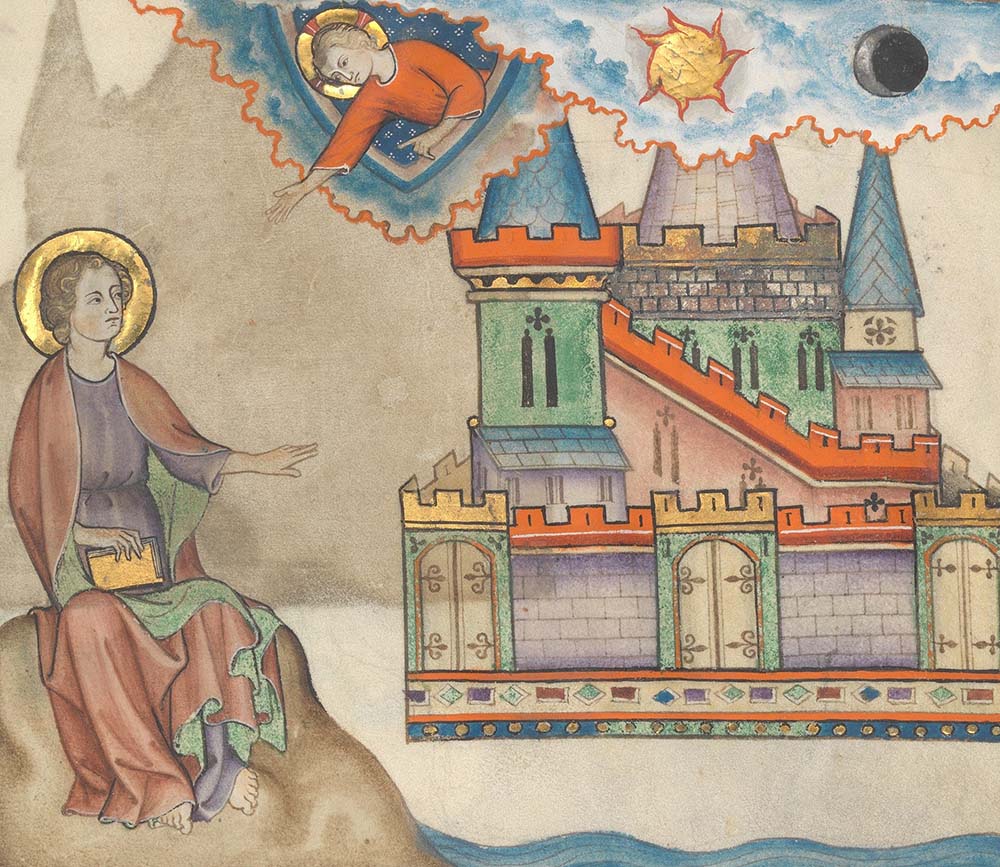
The New Jerusalem, illumination from the 14th-century French Cloisters Apocalypse (Metropolitan Museum of Art)
"God will wipe away every tear, there shall be no more death, mourning or weeping."
After all its extravagant symbolism, the Book of Revelation ends with this dangerously comforting vision of God's new heaven and earth. It's dangerous, not because of what it promises, but because we are so sorely tempted to skip the process that leads to this conclusion. We'd like to enjoy the comfort of the new without abandoning the luxury and splendid isolationism of "the old order" it replaces.
Paul and Barnabas caution us about this in today's selection from Acts, warning that hardships pave the road toward the reign of God. This reiterates Jesus' message in today's Gospel where, just as Judas has gone off to set the Passion in motion, Jesus announces that his glory is about to be revealed.
As we revel in spring, we might prefer to take a pass on the difficult character of the Easter messages and simply enjoy the weather as we anticipate the graduations, weddings and other events that mark this time of year. That's precisely what John wants to prevent. It's not that John wants us to mope around dwelling on the worst. Rather, he wants us to believe that, like Jesus, we enter most profoundly into the realm of grace when we confront the powers of evil.
What are these readings saying to us today, particularly in the U.S.? What is the "old order" that needs to be replaced?
When we are honest, we admit that our culture has schooled us in security — seasoned with a good dose of obliviousness. We can obtain emergency health care, security cameras, good locks, metal detectors and insurance for everything from our bank accounts to our pets. For those for whom that is not enough, we protect gun rights and assure the ironic combination of the freedom to refuse vaccinations while we are required to wear seat belts.
Our entertainment industry helps us avoid vulnerability with sports and comedy. It presents "reality" as a cut-throat, zero-sum game or it keeps alive a fairytale world through which we can vicariously face danger for 42 minutes and then live happily ever after.
In Fratelli Tutti, Pope Francis sums this up with almost apocalyptic language as he warns that we have "fed ourselves on dreams of splendor and grandeur, and ended up consuming distraction, insularity and solitude. We gorged ourselves on networking, and lost the taste of familiality." (Familiality offers a nongendered, inclusive alternative to the word fraternity.)
How in this world can we hope to understand the paschal mystery? What does the "new order" offer us in exchange for our splendid contentment? Francis answers the question with the word "hope."
Advertisement
In Francis' vocabulary, the virtue of hope is as costly as was Jesus' glory. Francis says that hope is "a thirst," a desire "for things that fill our heart." He explains that hope is bold enough to "look beyond personal convenience, the petty securities and compensations which limit our horizon."
Francis encourages us to broaden our vision and recognize that we "cannot live, develop and find fulfillment except in the sincere gift of self to others." That calls us to reevaluate cultural virtues like progress and hard work in the light of how they "foster openness and union with others."
Francis describes the goal of our humanity as agathosyne, "a striving for excellence and what is best for others," a yearning and "desire to fill the lives of others with what is beautiful, sublime and edifying." That sounds like a perfect description of what things look like on the streets of the new holy city John describes in today's vision from Revelation.
How are we to get to this new order, the reign of God where we understand the glory of the son of man?
Paul and Barnabas tell us that we will need to pass through many hardships. Here we are not called to deprivation, but the challenge of growing, of developing what Francis calls a "culture of encounter" through which we learn to appreciate the values of others, and particularly the poor. People on the margins can best reveal how our societies are structured to grant privilege to some at the expense of others and, on the personal level, they can help us discern the difference between what we need and what we love to hoard.
When we listen deeply to people who suffer, we become one family; their struggles become our own and we will be impelled to join them in confronting the evil that foments such suffering. Only then, after knowing the hope and pain of solidarity, will we know what it means for God to wipe away every tear that flows from our own and others' eyes.
[St. Joseph Sr. Mary M. McGlone serves on the congregational leadership team of the Sisters of St. Joseph of Carondelet.]
